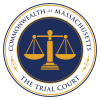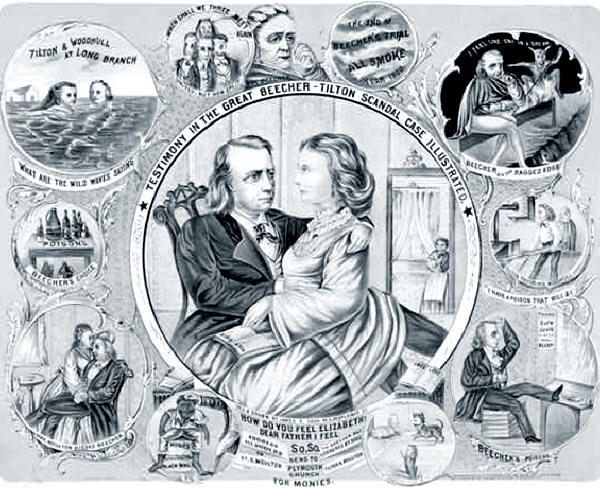- Trial Court Law Libraries
These rare book collections are distributed among the various law libraries in the statewide system.
Most are serendipitous survivals from the time when the state law libraries were individual county law libraries, maintained by lawyers associations for their own use. Our rare books therefore include many important English and American treatises and casebooks considered vital for a practicing attorney of the nineteenth and early twentieth centuries. Many are still consulted by attorneys today as irreplaceable authorities with rare insights.
Some of our historical books remind one of the universality of human foibles.
For example, the Massachusetts Trial Court Law Libraries preserve more than one copy of the transcript of one of the most celebrated and scandalous trials of the nineteenth century:
TILTON v. BEECHER (1875).
Henry Ward Beecher (1813-1887) was a prominent preacher, abolitionist, and social reformer. In his time, he was more famous than his sister Harriet Beecher Stowe, author of Uncle Tom’s Cabin (1852). The forward-looking Beecher advocated women’s suffrage and Darwin’s theory of evolution, and opposed all forms of racial, religious and social discrimination. His speeches drew thousands every week to Plymouth Congregational Church in Brooklyn, New York where he preached. He was equally a celebrity on the lecture circuit.
Beecher was accused of adultery with the wife of his friend and parishioner, Theodore Tilton, editor of the Independent newspaper, who lost both his job and his membership in the church for daring to accuse the famous Beecher. Tilton sued Beecher for monetary damages ($100,000) for his “distress in body and mind”, but the opening remarks of the retired judge Samuel D. Morris, acting as Tilton’s lawyer, made it clear that, for many, this trial was about more than money.
“This is no ordinary case…It is…more far-reaching in its consequences than any case ever tried in this country…This is a trial that involves…not the right to property or liberty, but it is a trial the consequences of which reach to the very foundations of society. The home, the marriage relation, with all that is dear in that relation, is upon trial in this case. Upon the result of your verdict to a very large extent, also, will depend the integrity of the Christian religion.” (vol. 1, p.19-20)
Although the trial record refers to Beecher’s behavior as “criminal conduct”, the fact was that in New York state, unlike Massachusetts, it was not illegal to commit adultery until 1907.
Ironically, Tilton’s views on marriage and traditional morality had become radical in the late 1860s, the years preceding the Beecher scandal. In his editorials in the Independent, Tilton advocated the “free love” doctrine favored by feminist Victoria Woodhull, which the married Beecher opposed. (Woodhull herself was imprisoned for accusing Beecher.)
Elizabeth Tilton, who had confessed the affair to her husband, never testified, because of an old common-law rule of inter-spousal immunity. Since her husband was the plaintiff, she could not testify. Mr. Tilton was allowed to testify, but was enjoined from mentioning any “confidential communications” with his wife, following the same common-law rule, under which marriage was considered sacred and one spouse was not permitted to testify as to anything that might hurt the marriage. Tilton’s testimony about the adultery was therefore elliptical and unconvincing. The jury could not agree on a verdict, and the case was never re-tried. Beecher was therefore “vindicated”.
Written By: Gary Smith

